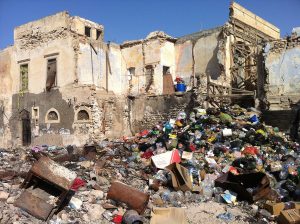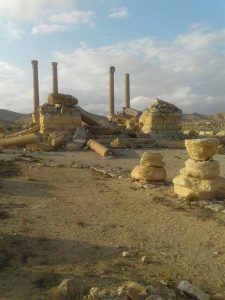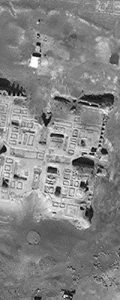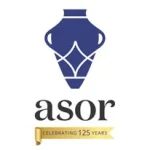
SHEPARD URGENT ACTION GRANTS
Click here for the Arabic version of this page.
ASOR plans to award two to four grants ranging from $2,500 to $10,000 (with a preference for smaller grants $5,000 or less) to projects to carry out emergency conservation or stabilization activities at archaeological sites in the wider Mediterranean and Middle Eastern regions. The total amount available for 2025 Shepard Grants is $15,000.
Because these grants are intended for emergency (or truly urgent) activities, ASOR will strive to provide a response within four to six weeks from submission of the application. Funds are normally available within 5-10 business days after all paperwork has been completed by successful applicants.
Established in 2020 with annual contributions, the “Shepard Urgent Action Grants” program was created to support emergency and rapid response activities on archaeological sites in the greater Mediterranean region. While preference will be given to excavation projects and teams with current ASOR affiliation, applications will be considered from all projects. Non-affiliated teams may apply for affiliation at the same time that they submit a Shepard Urgent Action Grant application. Please email Marta Ostovich, if you have questions or require more information.
Click here to apply for a Shepard Urgent Action Grant
انقر هنا للتقدم بطلب للحصول على منحة شيبرد للاجراء العاجل.
Guidelines
- The applications should be submitted by the director of the project. Please include the project conservator or other conservation professional in the application.
- Applicants will be asked to submit a separate statement explaining how the proposed activity is feasible and can be carried out safely in light of conditions currently in place in the project country, particularly in response to the Coronavirus pandemic.
- The total amount of awards for 2025 will be $15,000. Award amounts may range from $2,500 to $10,000, with most awards ranging from $2,500 to $5,000. Applications for amounts over $5,000 will be considered, but applicants should stress why a larger amount is necessary and critical. Applications for amounts exceeding $5,000 will not be considered for a smaller award. In general, proposals for smaller amounts that demonstrate a high impact will be given preference over proposals for larger amounts. Applicants are encouraged to provide matching funds.
- Applications will be accepted from any excavation project in the wider Middle Eastern and Mediterranean regions (see ASOR’s mission statement).
- These “rapid response” grants are intended to be for emergency or urgent activities and not for regular excavation activities. The following are examples (not an inclusive list) of activities that might be considered:
-
- Emergency documentation, stabilization or excavation of an archaeological site (or archaeological feature) that has been damaged by looting, vandalism, conflict, or natural causes.
- Emergency documentation, stabilization or excavation of an archaeological site or feature that is endangered by sudden environmental change (e.g., if a lake is expected to cover a site because of a newly constructed dam).
- Emergency protection of an archaeological site or feature that is in imminent danger from looting, vandalism, conflict or natural causes.
- Emergency stabilization of a critical site element or feature that is on the verge of structural failure or other severe deterioration, as a result of excavation.
- Emergency conservation treatment of unexpected or extraordinary finds from an excavation site (e.g., important evidence discovered unexpectedly and in urgent need of conservation before proper documentation and long-term conservation can be carried out).
- Applications should include evidence that site conditions necessitate urgent action and that the proposed urgent documentation, stabilization and/or conservation activities will be accomplished successfully with the funds provided. Preference will be given to activities that effectively address an urgent situation or crisis, rather than to activities that are part of a larger research program.
- Applications should include documentation (or a statement) that demonstrates that the applicants have the necessary permission(s) and authority to carry out the proposed work or activities.
- Only one application from an excavation project or site will be funded in any given year. In addition, the Selection Committee will give preference to excavation projects that have not received an Urgent Action Grant from ASOR in the past three years.
- Shepard Urgent Action Grants are not designed to fund travel for student volunteers or staff, nor are they intended to support dig participation fees. The grants are not intended to support research or excavation activities that could be postponed or delayed for six or more months. Rather, these grants are intended to support conservation, stabilization, excavation and/or documentation activities that are truly urgent.
- Funds will be made available from the ASOR office, and individual recipients may receive a Form 1099 for the funds received. Distribution of funds to non-U.S. citizens is contingent on vetting that may be required by law or statute in order for ASOR to comply with banking or other regulations. In order for ASOR to distribute funds to an institution, certain restrictions may apply. Only direct expenses are permitted, and no indirect costs or overhead may be charged by an institution receiving a Shepard Urgent Action Grant.
- Successful applicants will be expected to submit a report within 90 days of the completion of the project summarizing the methods used and the results achieved with the support of a Shepard Urgent Action Grant. The report should also document how the funds were used, and should contain high-resolution photos. In accepting the this grant, successful applicants agree that the report and photos may be used by ASOR on its website and for promotional purposes. If the work has not been completed within six months of the distribution of funds, ASOR requests an update from the project director.
Previous Grant Awardees: $81,625
2025: $7,350 awarded
- Khaled Abu Jayyab, University of Toronto, “The Tell ‘Arna Site Preservation Initiative”
- Julia Nikolaus, Ulster University, “he Al Haniyah Emergency Documentation Project”
2024: $14,650 awarded
- Gia Chilingarashvili, Ivane Javakhishvili Tbilisi State University and Georgian National Museum, “Rescue Excavation of a Chalcolithic Settlement in South-West Georgia”
- Rajwan Al-Maiyali, University of Al-Qadisiyah, “Restoration of Umm al-Qurun’s Minaret on the Hajj Pilgrimage Routes: The Darb Zubaydah”
2023: $30,000 awarded
- Paula Sconzo, University of Palermo, “Rescue Operations at the Site of Cham Pashaya, II”
- Murat Akar, Hatay Mustafa Kemal University, “Post-earthquake Action at Tell Atchana/Alalakh (Hatay, Turkey)”
- Mariam Eloshvili, Ilia State University, “Emergency Excavation for Data Collection from the Late Neolithic Settlement at Khramis Didi Gora, Georgia”
- Anke Weber, Humboldt University of Berlin, “Stabilizing History. Emergency documentation and consolidation of the pillars in the burial chamber of the tomb of pharaoh Ramesses III in the Valley of the Kings, Egypt”
2022: $7,125 awarded
- Maria Elena Ronza, SELA for Training and Protection of Heritage, “Emergency Conservation of the Roman Bathhouse in Petra, Jordan”
2021: $7,500 awarded
- Wahid Omran, Fayoum University, “Safeguarding and Documentation the Akhmim Tomb C4, Egypt”
2020: $15,000 awarded
- Tobin Hartnell, American University of Iraq, Sulaimani, “The Tabira Gate Stabilization Project at Ashur”
- Lindy Crewe, Cyprus American Archaeological Research Institute, “Stabilisation and refurbishment of a Chalcolithic roundhouse visitor centre at the archaeological site of Kissonerga-Mosphilia, Paphos District, Cyprus”




